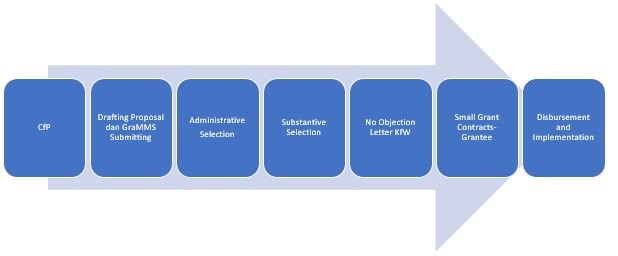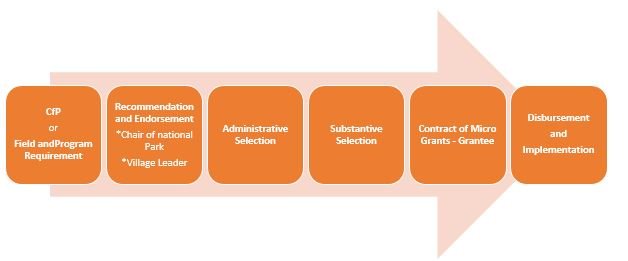Grant Mechanism
Small Grant Stages

Micro Grant Stages

Small Grant Selection Criteria
| Stage of Selection | Criteria |
| Administrative Selection | The completeness of the proposal submission documents becomes the basic criteria for obtaining SGP Indonesia Small Grants.
Documents to be provided: 1. Memorandum of Understanding (MoU) from KSDAE or Cooperation Agreement from the Authorities of GLNP/WKNP or Recommendation Letter from the Heads of the Authorities of GLNP/WKNP during the Cooperation Agreement submission process; 2. Substance and budget proposal in English in accordance with the template provided by SGP Indonesia; 3. Organizational Self-Assessment Form and Pre-Grant Inquiry Form in accordance with the template provided by SGP Indonesia; and 4. Official institutional documents such as SK Kemenkumham/Notarial Deed/Registered Certificate and/or similar documents. If the proposal proponent does not meet the administrative selection criteria as mentioned above, the proposal will be rejected immediately. |
| Substantial Selection | Criteria for assessing substance proposals consist of two parts, namely (1) the quality of the substance proposal, and (2) the quality of the budgeting (cost effectiveness).
A. The quality criteria for the substance proposal include: 1. The Suitability of the Strategy contained in the Proposal with SGP Indonesia’s Thematic Area. The suitability of the intended strategy is: (a) responsive to the SGP Indonesia’s thematic areas; (b) contribute to the indicators of SGP Indonesia’s success; (c) support national park management planning; (d) impacts on livelihood and conservation of biodiversity in the work area; (e) ensuring the sustainability of project results (achieving outcomes); and (f) ensuring the continued active participation of all stakeholders after the project ends (exit strategy). 2. Proposal Content. The assessment will review: (a) the clarity of the problem statement; (b) overall objectives, specific objectives/outcomes, outputs and key activities are clearly connected; (c) alignment between organizational capacity and staff capacity in supporting project achievement; (d) explain the approaches and methodologies related to organizing/increasing the capacity of project participants (the community), monitoring and evaluation system, and the sustainability of the parties’ engagement actions after the project ends. 3. Relevant Organizational Capability and Experience. Criteria include organizational experience in managing similar projects, field experience, relevance of staff expertise raised in the project, number of staff and project management competencies and technical implementation, presence of personnel and logistical support in the field, and the availability of financial management systems. 4. Gender. The assessment will review issues relating to women and vulnerable groups, as well as the impact of the project on their participation in biodiversity and livelihood protection actions. B. Quality budgeting criteria (cost effectiveness). These criteria will include: (1) a rational budget submission, (2) a comparison between proportional staff costs and activities, (3) 20% (in-kind) cost sharing, (4) overhead of no more than 6.75% of total project cost. |
